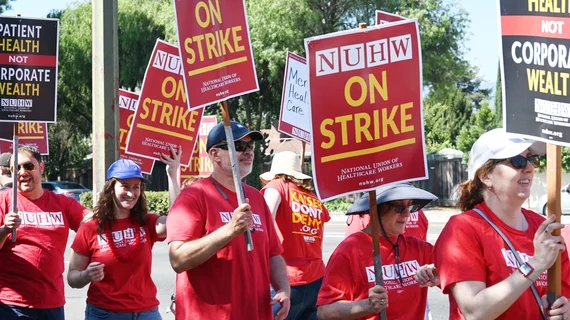Mental health workers at Kaiser go on strike
Nearly 2,000 unionized mental health workers from Kaiser Permanente facilities in California are on strike over contract negotiations.
The picket lines are outside medical centers in Fresno, Modesto, Oakland, Sacramento, Santa Clara and Santa Rosa. Kaiser mental health workers with the National Union of Healthcare Workers (NUHW) are taking part in the strike, which began Aug. 15.
According to Kaiser, the health system and the union workers have been negotiating for more than a year, with talks at a standstill over wage increases and the union’s demands to increase the time spent on tasks other than seeing patients. Kaiser has offered to provide more scheduled time for administrative tasks, but the union “is still demanding more” time, Kaiser stated.
The health system also slammed the union for striking, as well as its demands, arguing, “the union’s demand flies in the face of a 30% increase in demand for mental healthcare and NUHW’s own commitments to help improve access to mental health care,” in a statement. Kaiser also called the union’s tactics “harmful” and exploitative of current challenges. Kaiser further published statementsz refuting NUHW’s claims about staffing and hiring, therapist shortages, diversity and timely access.
However, the union has criticized Kaiser for failing to comply with a law about timely follow-up care for mental health patients. The NUHW took out a full-page ad in large newspapers in California calling out Kaiser for “flagrantly violating” a law that requires giving patients access to timely care, with timely follow-up appointments within 10 business days. The union stated it has made many proposals for Kaiser to make greater investments in timely care, but “Kaiser has rejected them all” and the health system “refuses to change its practices to comply with the law.”
According to NUHW, most patients with mental health needs are forced to wait between six and 11 weeks for follow-up care, while no follow-up mental health appointments are available at four Kaiser locations.
“We will strike as long as it takes for Kaiser to commit to recruiting and retaining sufficient staff for us to provide patients the timely care required by law,” the ad stated.
The union accepted wage increases from Kaiser last week, but rejected other offers that didn’t adequately address staffing shortages and reducing appointment wait times.
The union also wrote to the Department of Managed Health Care (DMHC), which stated Kaiser must still provide mental healthcare while the union workers are on strike.
“The law requires health plans to provide enrollees with medically necessary care within timely access and clinical standards at all times, which includes during an employee strike,” DMHC Director Mary Watanabe said in a statement. “I encourage any Kaiser enrollee experiencing issues with receiving appropriate access to care to contact Kaiser directly, or to contact the DMHC Help Center for further assistance."

